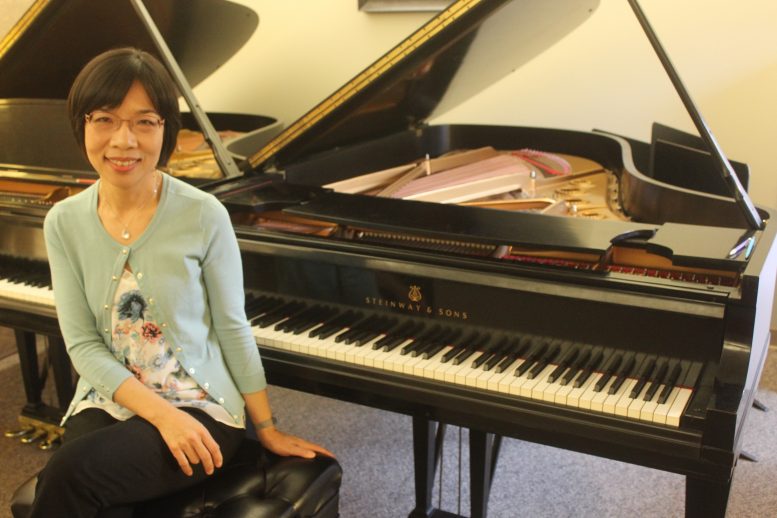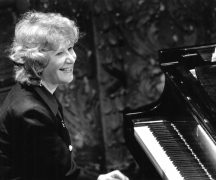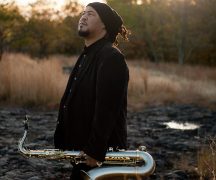By DAVID DUPONT
BG Independent News
Solungga Liu remembers the day well. A hot, rainy afternoon in her native Taiwan, and she was bored. So she randomly pulled a score from the shelf in her studio. It was the music of Charles Tomlinson Griffes.
She did not know his work much beyond his piece “The White Peacock.” She sat at her piano and began to sight-read through the music. She played through the entire book. “Right at that moment I couldn’t stop,” she remembers. “I fell in love with his works.”
That passion for the music of Griffes, whose work sits at the intersection of Romanticism and Impressionism, will be on display Sunday at 3 p.m. when Liu performs a Great Performances recital in the Toledo Museum of Art’s Great Gallery. The program will include Griffes’ transcription of “Les Parfums de la nuit,” the second movement of Ravel’s orchestral piece “Iberia,” a piece she premiered after its discovery. Music by Cesar Franck and Amy Beach, another little appreciated American composer, will also be on the program.
Two years after Liu’s discovery of Griffes’ music, she recorded “The Pleasure-Dome of Kubla Khan: The Piano Works of Charles Tomlinson Griffes” on Centaur Records. By that time Liu had joined the faculty of the College of Musical Arts at Bowling Green State University.
The Toledo concert will be similar to the one she presented last November at the Library of Congress in Washington D.C. It was there that the Debussy transcription had been discovered.
Liu said that Griffes, who was born in Elmira, NY, had studied for four years in Berlin. He heard an early performance of Debussy’s “Iberia.” He was so taken with the piece, that he faithfully transcribed its intricacies for solo piano.
Back in the United States he taught music at the high school in Tarrytown, NY, a job he hated. But it did give him access to New York City.
He traveled to the offices of the publisher G. Schirmer, and played his transcription for two people there.
That was, Liu said, the only public performance of the work. Copyright issues seemed to have scuttled hopes for publication, and the manuscript disappeared. Griffes seemed on the verge of a professional breakthrough when he died at 35.
Griffes scholars, Liu said, assumed the manuscript was lost. Then in 2016 it turned up in the vast archives of the Library of Congress. Excited by the discovery, officials approached Liu to perform it.
The program is filled out with Beach pieces, more Griffes, and Franck’s monumental “Prelude, Chorale and Fugue.” Like the other pieces on the program the Library of Congress holds the manuscripts.
“The big purpose to give the concert was really to promote the manuscript collection,” Liu said.
“When they asked me to premiere this piece, I couldn’t sleep for many days because it was such a huge honor to be so connected to a composer whose works I love so much.”
The piece is difficult to play, she said. “There’s so much going on in the orchestra. … It’s the performer’s job to make each of these layers speak. But I had a great time.”
Liu wanted to include Beach because 2017 was the 150th anniversary of her birth in New Hampshire. Though Beach was a leading composer of orchestral work, little was made of the anniversary.
A child prodigy, Beach had little musical education other than piano lessons with her mother. For 18 years she put her performing career on hold as part of the marriage agreement with the elder doctor she had married. After his death, she resumed performing publicly.
“I love the Amy Beach pieces,” she said. “They are very virtuosic, almost like Liszt.” Her piano music “is very rich in texture, chromatic but still in a very, very melodic with very long lines.”
And her work is much in contrast to Griffes’ pieces with their “incredible contrast and dramatic range.”
Beach wrote songs as well and Liu said when hearing some, even when coaching a singer and pianist, she is moved to tears.
Beach and Griffes were both influenced by the European composers of their times, and their music is untouched by folk idioms.
Liu’s own musical education also followed an unusual path. She started playing piano “out of curiosity” at age 4. But unlike “tiger mom” stereotypes, her parents encouraged her not to practice too much, 20 minutes day was fine, and instead go outside and play. Still they would make the two-hour trip every two weeks to bring her to Taipei to study with one of the foremost teachers in the country.
Liu was in her teens when she really started to study seriously. “I’m such a late bloomer.” She attended the National Taiwan Normal Teachers University. She came to the United States to do her graduate studies at Eastman Conservatory in Rochester, NY.
“When I was at Eastman, I fell in love with practicing because I heard how amazing, how beautiful, music can be,” she said. “It’s never too late.”
Also at Eastman, Liu discovered her love of playing contemporary music. She studied with Alan Feinberg, a leading proponent of new music. His recording “The American Virtuoso” introduced her to the music of Beach.
After receiving her doctorate at Eastman, she returned to Taiwan. She enjoyed her seven years there teaching, but “I felt more and more alone as a new music performer.”
She’d already heard of BGSU and its new music focus when she was at Eastman, where he also met future BGSU piano colleague Thomas Rosenkranz.
She applied for a position in BGSU, and joined the faculty.
Here she continues her advocacy both of new music and older music that’s little played. “What I really love is to promote lots of rich but under-heard repertoire. There are so many (composers) out there.”





